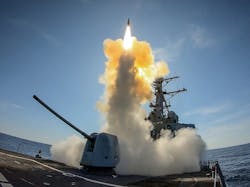Raytheon to build Aegis fire-control systems for shipboard electronics aboard Navy Burke-class destroyers
WASHINGTON – Shipboard electronics experts at Raytheon Technologies Corp. (RTX) are building MK 99 fire-control systems for the Aegis weapon system aboard U.S. Navy Arleigh Burke-class destroyers under terms of a $76.4 million contract announced in September.
Officials of the Naval Sea Systems Command in Washington are asking the RTX Raytheon segment in Marlborough, Mass., to build MK 99 Aegis fire-control systems, hardware, and engineering support.
The MK 99 fire-control system (FCS) functions as the interface between the Aegis AN/SPY-1 radar and the ship-launched SM-2 family of anti-air missiles aboard the Burke-class destroyer. The MK 99 fire-control system communicates with the missile-control station, notifying it of the air threat, and then illuminates the missile's target.
The contract covers MK 99 FCS units for Burke-class ships and the U.S. Missile Defense Agency (MDA), and FCS hardware for the government of Australia.
The MK 99 also controls the loading and arming of shipboard missiles aboard Burke-class destroyers and Ticonderoga-class cruisers. The MK 99 launches and provides terminal guidance for the ship's missiles, and controls the continuous-wave illuminating radar to provide a high probability of target kill.
The Aegis weapon system comprises the AN/SPY-1 radar, the MK 99 fire-control system, weapon control system (WCS), the command and decision suite, and SM-2 Standard missile family, which includes the basic RIM-66, the RIM-67 extended range, and the newer RIM-161 to counter ballistic missiles. The extended-range RIM-174 was deployed in 2013.
The MK 99's radar transmitter is being upgraded to improve performance and reduce acquisition and maintenance costs. The MK 99 illuminator transmitter upgrade is replacing obsolescent traveling wave tube (TWT) technology with solid-state transmitters to improve the MK 99's mean time between failures.
The system's solid-state transmitter and open-systems architecture also will enable upgrades for new technologies and capabilities over the lifetime of system.
On this contract Raytheon will do the work in Andover, Marlborough, and Burlington, Mass; and Chesapeake, Va., and should be finished by December 2025. For more information contact Raytheon Intelligence & Space online at www.rtx.com, or Naval Sea Systems Command at www.navsea.navy.mil.

John Keller | Editor-in-Chief
John Keller is the Editor-in-Chief, Military & Aerospace Electronics Magazine--provides extensive coverage and analysis of enabling electronics and optoelectronic technologies in military, space and commercial aviation applications. John has been a member of the Military & Aerospace Electronics staff since 1989 and chief editor since 1995.

